
Brazil’s Coalition Against Democracy
Jair Bolsonaro’s electorate—a loose coalition brought together by the candidate’s appeal to “bullets, bibles, and bulls”—stands perilously close to dragging Brazil back into authoritarianism.


Jair Bolsonaro’s electorate—a loose coalition brought together by the candidate’s appeal to “bullets, bibles, and bulls”—stands perilously close to dragging Brazil back into authoritarianism.

Building on the legacy of the assassinated Rio councilwoman Marielle Franco, a new wave of local candidates is fighting to transform the country’s democracy.

Since Dilma Rousseff’s impeachment, Brazil has been in political turmoil. With ex-president Lula’s recent surrender, a new right threatens to become the decisive force in the 2018 elections.

In the face of a far-reaching austerity package being imposed by an unelected government, more than 1 million Brazilian workers took the streets Friday for the country’s first general strike in decades.
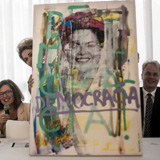
Dilma and Lula have been refashioned as leftists in defeat. But for the Workers’ Party, it might be too late.

In her new book, Our Sister Republics, Caitlin Fitz exhumes a forgotten moment in the history of the Americas, a time when residents of the newly formed United States came to see Latin Americans as partners in a shared revolutionary experiment.
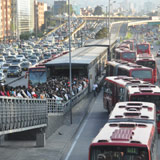
Since the early 2000s, when the Shell-backed EMBARQ began promoting bus rapid transit (BRT), a wide range of philanthropists and transit advocates have seized on the “technical fix,” which promises to solve a recognized problem without challenging the power relationships that created it.

As Latin America’s “pink tide” appears to ebb, Patrick Iber, Javier Buenrostro, Sujatha Fernandes, Bryan McCann, and Thea Riofrancos examine its lessons for democratic socialists in the region and abroad.
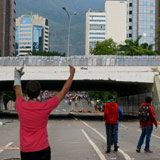
Targeted use of revenue from commodities can be an immediate and necessary salve against brutal levels of poverty and inequality, but Chavismo’s “extractivist” model has left Venezuela as vulnerable as ever to the whims of the international market.
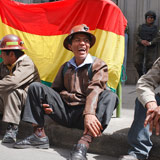
Populism is extremely limited if it is not coupled with highly organized grassroots movements with the ability to shape politics from the ground up.
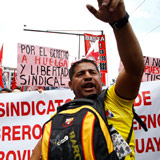
The central protagonists of Latin America’s profound shift away from the neoliberal policies of the 1980s and ‘90s were not strong leaders but social movements.

If there is any positive aspect to Brazil’s current crisis, it is the reemergence of non-partisan, civil-society mobilization in response to impeachment and its fallout.

Democratic socialism cannot emerge exclusively, or even primarily, from the grassroots—it implies the structuring of social resources in ways that require government action.
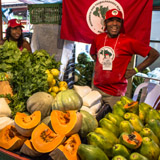
It is notoriously difficult to convict corporations of a crime in a foreign country. But on November 17, 2015, a Brazilian judge found the Swiss transnational agribusiness Syngenta liable for instigating deadly violence. The company was held responsible for attacking …

You might mistake Terezinha Silva for a middle-aged eco-fundamentalist from Brooklyn. In fact, she is a militant member of São Paulo’s working-class housing movement. I first met Terezinha at a workshop in São Paulo last summer. In attendance were over …